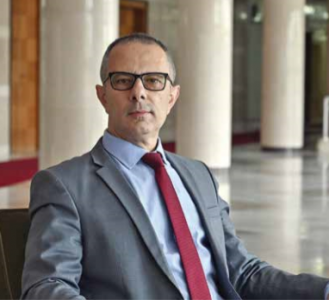Financial sustainability is one of the most pronounced problems of the civil society in Serbia, especially for smaller organizations that don’t operate in large regional centres

Serbia today has 32,000 registered associations. We are talking to Žarko Stepanović, Director of the Office for Cooperation with Civil Society, about their position and potential for biggest cooperation with the state authorities.
You have been appointed director after working in the non-governmental sector for many years. Could you tell us what is the difference between the state’s and the civil sector’s mindset?
— My experience of working in the civil and public sectors has allowed me to look at our social situation from two to a certain extent different angles of observation. Perhaps the main differences are in understanding time, or the way they view the speed at which changes and reforms need to be implemented. On the one hand, it is difficult for civil society to see how the state administration functions from within, as they often think in a way that is critical to the achievements of the administration, and expect faster results and changes. On the other hand, it is difficult for the state administration to perceive all aspects of the situation on the ground due to its central position and perspective. Since they have very different perspectives, it is necessary to further boost the cooperation and trust, which is definitely hindered by the sensationalistic headlines about the civil society in the media, certain CSOs distancing themselves from the citizens because they are forced to allocate their resources towards ensuring financial viability more than towards the target groups. It may look paradoxical, but these different perspectives should be and are the meeting point, and create a space for dialogue and debate on many important social issues. Our Office plays a role of a kind of mediator that approaches these two special but complementary segments of society.
After three years of being the director, what is your view of the current cooperation between the state and the civil sector? Is there any room for progress?
— The civil sector is not a homogeneous structure, as organizations have different capacities, areas of operation, goals, and they vary by number and type of activity. The intensity and the ways and forms of cooperation are different. Today, unlike in 2016, most institutions understand the need for cooperation better. Our Office is at the disposal of all institutions. Progress has been made in the field of transparent state financing of CSOs. Certain areas have recorded weaker cooperation, so, last year, we had several initiatives to assess the constitutionality of the adopted laws, while the organizations created platforms that required that certain laws be withdrawn from the procedure and to prevent the constriction of the space for civil society. There is room for improvement, and the new legal framework creates significant opportunities while making it obligatory for the state authorities to cooperate with CSOs and citizens in the process of passing regulations and public policies. In the coming period, the Office will work a lot on encouraging the implementation of the Law on the Planning System and accompanying bylaws, as well as the Law on State Administration. Also, a great potential, but above all, an enormous space for improvement, lies in the areas where civil society can help the state through providing services for very sensitive to categories of the population such as social and health care, free legal aid, supporting the LGBT+ population and various minorities and others.
What are the problems of civil society in Serbia and can you solve them?
— Financial sustainability is one of the most pronounced problems of the civil society in Serbia, especially for smaller organizations that don’t operate in large regional centres, that can be resolved through building trust and informing the public about the results of their work. The Office seeks to contribute to the problem’s resolution by promoting good practices of the cooperation between CSOs and the state, through greater involvement in policymaking and dialogue with public administrations, while providing a platform for dialogue on important issues. In 2018, the Serbian government adopted a new decree that brings about significant changes to the process of allocation of budget funds to CSOs. One of the stipulations from the decree states that the Office had to publish an e-calendar of all planned public competitions that pertain allocation of funds from the 2019 state budget which contains an overview of all the competitions that the public administration is planning to launch, which can be searched via different categories. By doing so, we have improved transparency, while CSOs can now find information about all the competitions from one source and start preparing their project proposals on time.
What is your comment on frequent attacks on civil society organizations in Serbia?
— The Office strongly condemns attacks and threats to certain civil society organizations. It is of the utmost importance that the line institutions respond to attacks, as well as to preserve the level of achieved rights, first and foremost, the freedom of association and the freedom of thought and expression, as the fundamental principles of democracy.